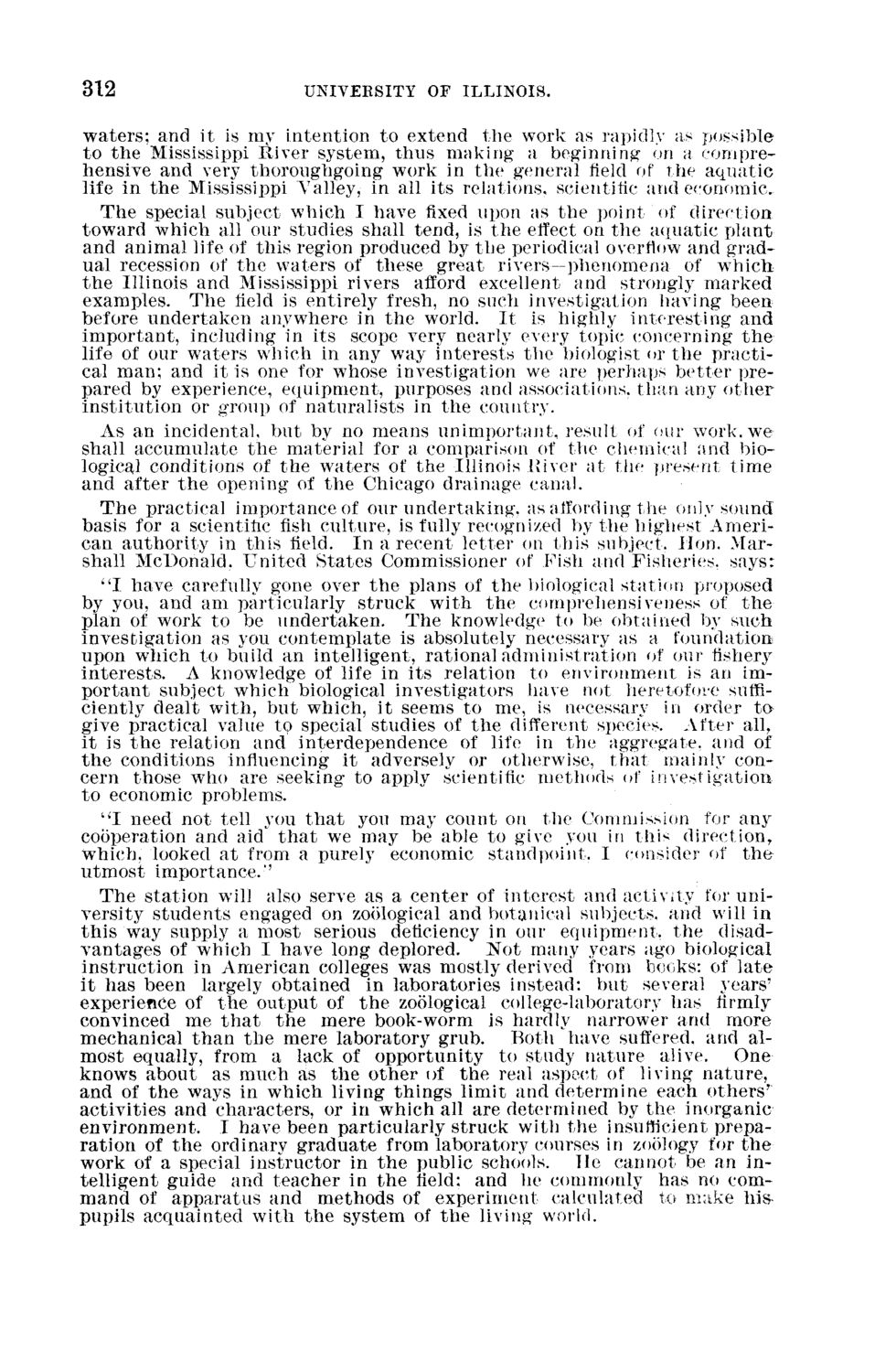| |
| |
Caption: Board of Trustees Minutes - 1894
This is a reduced-resolution page image for fast online browsing.

EXTRACTED TEXT FROM PAGE:
312 UNIVERSITY OF ILLINOIS. waters; and it is my intention to extend the work as rapidly as possible to the Mississippi River system, thus making a beginning- on a comprehensive and very thoroughgoing work in the general field of the aquatic life in the Mississippi A alley, in all its relations, scientific and economic. The special subject which I have fixed upon as the point of direction toward which all our studies shall tend, is the effect on the aquatic plant and animal life of this region produced by the periodical overflow and gradual recession of the waters of these great rivers—phenomena of which the Illinois and Mississippi rivers afford excellent and strongly marked examples. The field is entirely fresh, no such investigation having been before undertaken anywhere in the world. I t is highly interesting and important, including in its scope very nearly every topic concerning t h e life of our waters which in any way interests the biologist or the practical man; and it is one for whose investigation we are perhaps better prepared by experience, equipment, purposes and associations, than any other institution or group of naturalists in the country. As an incidental, but by no means unimportant, result of our work, we shall accumulate the material for a comparison of the chemical and biological conditions of the waters of the Illinois River at the present time and after the opening of the Chicago drainage canal. The practical importance of our undertaking, as affording the only sound basis for a scientific fish culture, is fully recognized by the highest American authority in this field. In a recent letter on this subject. Hon. Marshall McDonald. United States Commissioner of Fish and Fisheries, says: " I have carefully gone over the plans of the biological station proposed by you, and am particularly struck with the comprehensiveness of t h e plan of work to be undertaken. The knowledge to be obtained by such investigation as you contemplate is absolutely necessary as a foundation upon which to build an intelligent, rational administration of our fishery interests. A knowledge of life in its relation to environment is an important subject which biological investigators have not heretofore sufficiently dealt with, but which, it seems to me, is necessary in order to* give practical value to special studies of the different species. After all, it is t h e relation and interdependence of life in the aggregate, and of the conditions influencing it adversely or otherwise, t h a t mainly concern those who are seeking to apply scientific methods of investigation to economic problems. U I need not tell you t h a t you may count on the Commission for any cooperation and aid t h a t we may be able to give you in this direction, which, looked at from a purely economic standpoint, I consider of* the utmost importance.'' The station will also serve as a center of interest and activity for university students engaged on zoological and botanical subjects, and will in this way supply a most serious deficiency in our equipment, the disadvantages of which I have long deplored. Not many years ago biological instruction in American colleges was mostly derived from books: of late it has been largely obtained in laboratories instead: but several years7 experience of the output of t h e zoological college-laboratory has firmly convinced me t h a t the mere book-worm is hardly narrower and more mechanical than the mere laboratory grub. Both have suffered, and almost equally, from a lack of opportunity to study nature alive. One knows about as much as the other of the real aspect of living nature, and of the ways in which living things limit and determine each others' activities and characters, or in which all are determined by the inorganic environment. I have been particularly struck with the insufficient preparation of the ordinary graduate from laboratory courses in zoology for the work of a special instructor in the public schools. He cannot be an intelligent guide and teacher in the field; and he commonly has no command of apparatus and methods of experiment calculated to make his pupils acquainted with the system of the living world.
| |